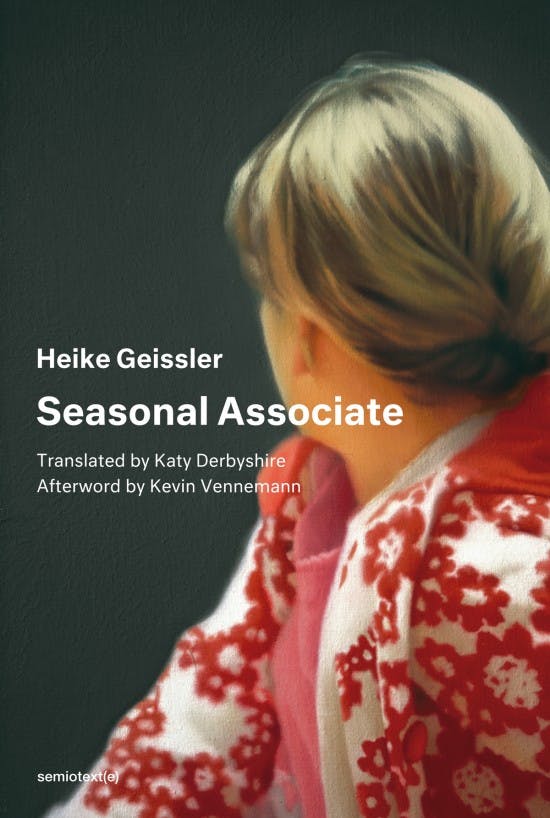In propounding one of his most intuitively appealing theories, Marx asked, “In what, then, consists the alienation of labor?” Alienation is the emotional state that takes place when capitalism divorces the worker from the product he creates. Because he does not “realize himself in his work,” the worker is only happy when he is not doing it: “He feels at home when he is not working, and when he is working he does not feel at home.” This is obvious, for Marx, because nobody works when they don’t have to. It is what makes working under capitalism a kind of forced labor.
Alienation is the chief theme in Heike Geissler’s 2014 book Seasonal Associate, published in the U.S. for the first time this December. The narrator, who is not named but strongly resembles Geissler, is a freelance writer and translator who has fallen on hard times (surprise, surprise). Squeezed by her financial precarity—she has children and debt—the narrator applies for a temporary job in an Amazon warehouse in Leipzig. She approaches her interview with a grinning resistance, disobeying a wall sign’s command to use the handrail by the stairs, for example.

That meager dose of autonomy dissolves once she gets the job. The book is written mostly in the second person, with our unnamed narrator addressing somebody as “you.” The “you” is ostensibly her former self, the worker-self who is in the Amazon warehouse, as opposed to the writer-self, who is “real,” looking back on these strange events. At the start of the worker-self’s ordeal, the writer-self explains that, actually, you need this job. “You instantly grow ancient and wooden” at this revelation. From this moment on, you are “beside yourself with worry,” and the anxiety never abates.
Embedded into the very narrative structure of Seasonal Associate is Geissler’s awareness that the laborer under capitalism, bereft of control, splits into multiple selves who are alienated from each other. Who is the “I” who works for Amazon, and why is she so quiet? Geissler presses down hard on the identity changes that take place inside the worker who does not see herself in her work, then sublimates that analysis into the texture of her account.
This literary-political hyperawareness might sound intrusive or unhelpfully cerebral, but it actually reads as consolation. Geissler also scatters her book with meditations on work from Gertrude Stein, Eva Meyer, Monica de la Torre. There is an economy to being a person, de la Torre writes in her poem $6.82:
My economy is broken, mispronounced.
My economy has cold feet, even if there are plenty of socks at home.
My economy would like to be wholesome and sound.
My economy is a gift certificate that is not enough for what I’d like to have,
so I end up spending money at a store that I dislike in the first place and
will never visit again.
When the writer-self quotes lines from smart people who have also tried to understand how work and money affect the human experience, it is as if she is trying to soothe the Amazon-worker-self with memories of the other part of her brain, which still survives, though starved of oxygen. This all feels so terrible, she seems to say, but it doesn’t mean you’re not a writer.
The working conditions do sound terrible, unrelentingly so. The protagonist works beside a door that will not shut, allowing a draft that causes her to become and remain sick. The workers are supposed to be organized according to a nonhierarchical, horizontal structure, but in fact she is browbeaten and harassed by odious male colleagues. Her hands become chapped and remind her of her father’s hands.
Meanwhile the work—the work itself, not the conditions—grows absurd to a point beyond alienation, a point beyond language. “You come across a glass bathroom duck with a barcode not recognized by the computer. A new product, says Norman.” (The writer-self uses a lot of names for the other workers—Hans-Peter, Miriam, Uwe—but none for “you.”) The wayward duck must be addressed. “You take a closer look as you’re carrying it across the hall, barely noticing the floor markings. You’re carrying a glass bathtub duck; neither you nor I can say anything else about that.”
The unspeakability of the bathroom duck expresses two things. First, that any scenario that is sufficiently absurd can become funny in recollection, even if it was pure suffering at the time. Second, that language has become incommensurable with the Amazon-worker’s experience, because she is engaged in a kind of labor so alienated from ordinary existence that it cannot really be described.
Seasonal Associate makes working in an Amazon warehouse sound exactly as unpleasant as it is. As New York City reels from the news that the corporation will be taking up residence in Queens, and as protests by Amazon workers disrupted Black Friday across Europe, America’s culture of instant consumerism is being forced, at last, to confront the fact that this labor is done by people. We hear “fulfillment center” and we think of automation, of labor-saving systems that might reduce human alienation rather than enhance it. But this impression is a false one, and Seasonal Associate drives home this message with startling abruptness.
“We won’t be leaving this book before you’ve taken action,” the writer-self says. “I’m not sure. Have you taken action or not? Yes, you have. We’ll see.” Who is speaking here? We do not know: The writer and the worker inside Heike Geissler seem to come together at moments when action is demanded; the two identities become fluid, uncertain. The unasked question seems to be whether writing a book constitutes political resistance against this corporate behemoth, or whether anything can be said to be “done” until citizens show up in support of Amazon’s workers.
In Seasonal Associate, Geissler finds the absolute limit of writing about labor, at the very moment that history seems to have hit the same point. The “you” of Seasonal Associate is also, of course, the reader: This book is required reading for any consumer with a conscience. You won’t leave it without taking action.
